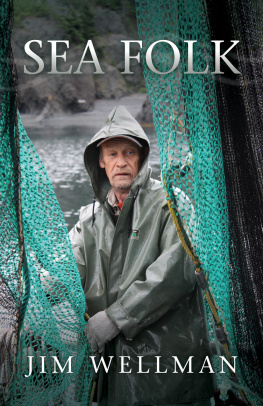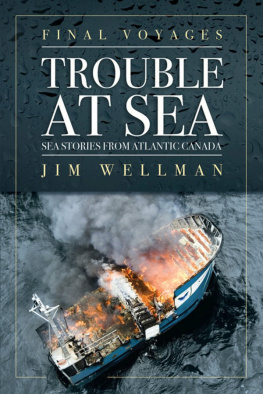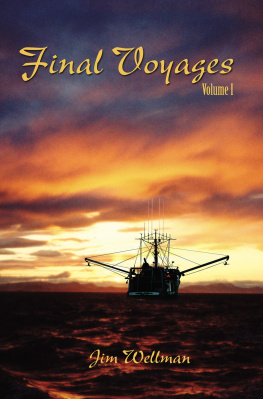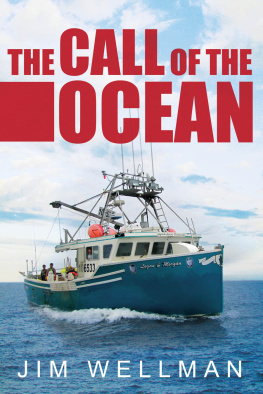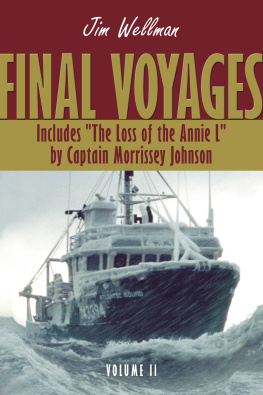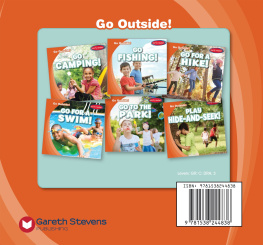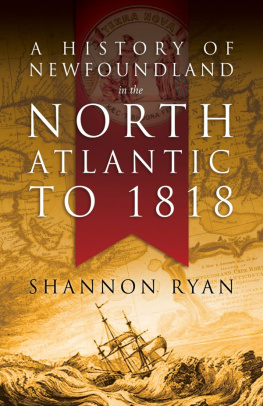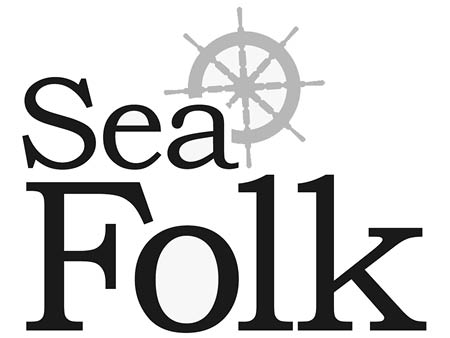
Jim Wellman
Flanker Press Limited
St. Johns
Library and Archives Canada Cataloguing in Publication
Wellman, Jim, 1946-
Sea folk / Jim Wellman.
IIncludes index.
Electronic monograph issued in various formats.
Also issued in print format.
ISBN 978-1-77117-225-7 (EPUB).--ISBN 978-1-77117-226-4 (MOBI).--
ISBN 978-1-77117-227-1 (PDF)
1. Fishers--Atlantic Provinces--Biography. 2. Fisheries--Atlantic
Provinces. I. Title.
SH20.A1W44 2013 639.220922715 C2013-901141-2
2013 by Jim Wellman
a ll rights reserved. No part of the work covered by the copyright hereon may be reproduced or used in any form or by any meansgraphic, electronic or mechanicalwithout the written permission of the publisher. Any request for photocopying, recording, taping, or information storage and retrieval systems of any part of this book shall be directed to Access Copyright, The Canadian Copyright Licensing Agency, 1 Yonge Street, Suite 800, Toronto, ON M5E 1E5. This applies to classroom use as well.
Printed in Canada
Cover Design: Adam Freake
Flanker Press Ltd.
PO Box 2522, Station C
St. Johns, NL Canada
Telephone: (709) 739-4477 Fax: (709) 739-4420 Toll-free: 1-866-739-4420
www.flankerpress.com
17 16 15 14 13

1 2 3 4 5 6 7 8 9
We acknowledge the financial support of the Government of Canada through the Book Publishing Industry Development Program (BP IDP) for our publishing activities; the Canada Council for the Arts, which last year invested $157 million to bring the arts to Canadians throughout the country; the Government of Newfoundland and Labrador, Department of Tourism, Culture and Recreation.
Dedication and Acknowledgements
This book is dedicated to everyone in the fishing industry.
For the past five centuries, thousands of people in what is now called Atlantic Canada have depended on the oceans bounty for survival. It hasnt always been easy. Far too many barely managed to make ends meet and others have lost their lives to an often unforgiving sea. But still, the ocean also gives freely of her bounty and thousands of Atlantic Canadian men and women today are still doing what their forefathers and mothers did years ago. We salute them.
Id also like to dedicate this book to the directors of the Navigator magazine and the TriNav Group of Companies. Paul Pinhorn, Trevor Decker, and Rick Young have given me the platform to publish my short stories in the Navigator for the past fifteen years since the inception of the publication. Their support and encouragement has been tremendous. And thanks also to the editor of the Navigator , Jamie Baker, for his support. Among other things, he provided the cover photo, that of fisherman Dave Jenkins from Clarkes Beach, NL, capelin seining on board the longliner Chelsea Noelle I.
And thanks to all the people who allowed me to take so much of their time to ask questions about their lives and especially about the loved ones they lost to the sea.
You are all Sea Folk who make our lives richer because of your contributions.
Thank you.
Preface
The fishing industry shapes and moulds fascinating people.
Sea captains and fishermen are different than people who work on land, due partly, I suppose, to the fact that they work in the most dangerous trade on earth, but also because they never know what the sea will deliver. One year, the ocean can produce a bountiful crop, but the following year can be a financial disaster. But whatever it is about a life on the sea, most wouldnt trade it for anything else in the world. Some say its because they have salt water running through their veins that cant be washed away and forgotten.
The fishing industry has produced a unique culture that also extends to more than people who work on board vessels. With constant uncertainty of raw material supply, even from one day to the next, fish processing plants make for a different sort of workplace. Consequently, fish plant owners and operators along with the men and women who work there are also a different breed. Several of the stories in this book profile some of the fascinating folk who work in boats and/or process fish on land.
Ive been privileged to know so many fisheries people from all over Atlantic Canada and I am deeply honoured to be able to tell some of their stories.
Contents
Fisherman
Many people, including writers, have tried to describe what it is like to be a fisherman. Very few of us have come close to the way the late Joseph OBrien of Bay Bulls so eloquently explained it to a young school student who was doing a class project in the early 1980s. Mr. OBriens simplistic but articulate ramblings to the student, captured beautifully the way it was and the way it will never be again. In turn, the student wisely wrote Mr. OBriens words in the vernacular, thereby providing us with a more personal glimpse into the culture of small-town Newfoundland more than thirty years ago, when the cod fishery sustained about 200 communities that dotted the coastline of Newfoundland and Labrador.
We thought it appropriate to start this book with a peek into the soul of an inshore fisherman as captured in a school project by a young Bay Bulls student, Fern Burke, titled very simply:
The Fisherman
... I was named after a great saint, St. Joseph. He was a carpenter, but I didnt follow upon him that way. I am a fisherman.
Ive big marks on my arms from saltwater pups. Theyd get all infected and my hands would swell right up. Id take my pocket knife and cut open my gloves to get them on. But you had to go; you had to do it.
We have six childrenthree boys and three girls. Loyola and Joe, they learned to fish with me. I used to take their mother along because they wasnt afraid of me, but they was afraid of her. She fished with us for yearsa strong woman. Shed stand behind the hydraulic winch, shed pull the nets, and wed clear out behind her. The three of us would take out the codfish, the flounder, and the crab. Shed keep the boat going ahead into the wind.
Wed bait our hooks in the nighttime. Wed go away before dawn. When we got the trawls all set, wed make a good fire, boil the kettle, toast up some bread and a bit of fish, and have our lunch. Id always cook. My wife said I was a better hand for cooking fish than she was. It was probably an excuse, but I believed her. After lunch wed haul back our longlines. Wed get in about midday and sell our fish. Wed go out again in the evening to jig squid for bait. Theyd squirt this awful black dye into our eyes, and when we came home, it would take us half an hour to wash ourselves before we could go to bed.
It wasnt an easy job, but it was joyful. There was something about it. The sun came out of the water in the morning. Youd hear the birds singing and whistling, and if there was fish on your longline, you didnt care if the world hung upside down.
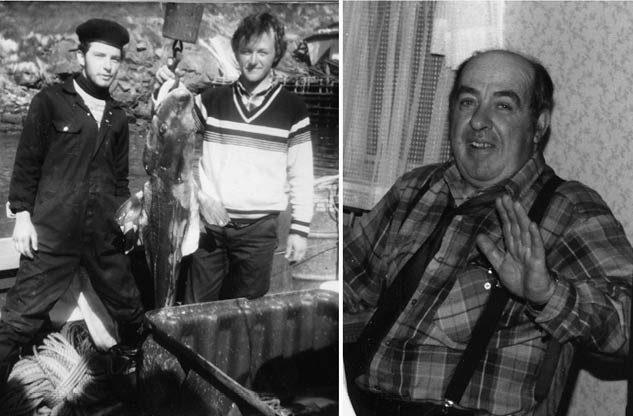
Left: Joe and Loyola OBrien
Right: The late Joseph OBrien, a well-known inshore fisherman
from Bay Bulls, NL
(Photos courtesy of the OBrien family)
To be a doctor in Canada, youve got to go to college for six or seven years. To be a good fisherman, a prosperous fisherman, you also have to go to school. You have to learn to mend and how to knit your nets, make sails and traps, repair or build your boat. Youve got to be a carpenter. Youve got to build your own house. Youve got to be a meteorologist; know the weather, the moon and stars, the tides and the winds and where the fish congregate at certain times. When the water temperature changes, you must know whether to set your nets deeper or shallower.
Next page
